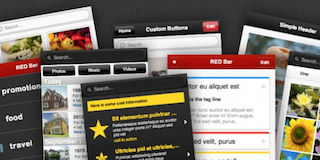When you buy a smartphone it is typically loaded with several apps. In addition to these apps, you can also download or purchase other apps from the AppStore, Android Market, Blackberry Market and other distribution channel associated with your device. Those apps are considered Native Apps. They are created for the specific devices using programming languages such as ObjectiveC in the case of iOS (iPhone, iPad, iPod Touch), or Java for Android based phones and tablets. Native apps are more dependable and can take full advantage of the device capability such as camera, file system, access to the address book, photos, etc.
Native apps are limited to a single platform or device operating systems. They are more expensive to develop and harder to maintain. These apps require installation and regular updates as the underlying operating systems change. Moreover, to make them available in other devices the code requires to be ported, which in some cases result into duplicate efforts.

Examples of Native Apps (Facebook, NYTimes, Yelp)
Webpass in other hand, offer a much simple and yet comparable alternative. You have probably visited some website from your mobile browser and noticed that it looks and works similarly to their native app counterparts. These webapps work with the widespread of mobile web browsers. A webapp can be easily accessed by typing its URL in your mobile web browser. Webapps are easy to use and from the visual and usability viewpoint, they are comparable to native apps. Mobile webapps provide access to the most commonly used device features.
Newer devices now run faster Javascript engine and support HTML5 and CSS3, making the overall webapp experience smooth and very responsive. Since webapps can leverage work previously done for your website, their development costs are way more reasonable compared to native apps. In some cases, such as iOS devices, webapps can also be access from the Homescreen and run in Fullscreen mode, similarly to native apps.

Examples of HTML5 Mobile Apps (Zillow, Kayak, Twitter)
| HTML5 Apps | Native Apps | |
|---|---|---|
| Audio | Yes | Yes |
| Video | Yes | Yes |
| Database | Yes | Yes |
| Yes | Yes | |
| Maps | Yes | Yes |
| Geo Location | Yes | Yes |
| Homescreen Shortcut | Yes | Yes |
| Social Media | Yes (via REST API) | Yes |
| Feeds | Yes (via JSONP) | Yes |
| Animation | Yes (CSS3) | Yes |
| Notifications | - | Yes |
| File Downloads | - | Yes |
| Camera | - | Yes |
| GPS | - | Yes |
| Core APIs | - | Yes |
| Cross platform Support | Yes | – |
| Searchable (Google / Bing / etc.) | Yes | – |
Both mobile webapp and native app have their own benefits and downsides. Both types of apps can deliver the performance to make users feel engaged using their mobile devices. But there is no single best solution because mobile webapp and native app complement each other. It is important to understand that as the mobile market use grows, providing what the mobile users need is what will certainly prevail.
Not registered? Create an Account.
Lost your password? Click here to recover.
Create, customize, and publish mobile web applications using the Appcropolis Mobile Builder.
Get Started
We offer 1,000's of mobile templates that are fully designed, coded, and ready to use. Learn more.
Download Free Templates
Hi Raul, Awesome post. It's true, both methods can be great depending on what is being built and how users will engage with the content. I'm a big supporter of HTML5 technologies and see a bright future in store for mobile websites/apps being generated with it. I'm betting big on HTML5 and actually built an interface-building tool for jQuery Mobile called Codiqa (shameless plug). Basically, I wanted to make it easier for visually mocking-up jQM/HTML5 mobile components with a simple drag-and-drop system. I'd love to hear your thoughts on it! Thanks for the awesome write up! I will be keeping up with further posts here. Ben
Hey Ben, Thanks for your comments. I am glad to hear that we are in the same page when it comes to HTML5 and mobile web applications. I am familiar with Codiqa, although I have not checked it in a while. I will visit the site soon to see what's new. --Raul